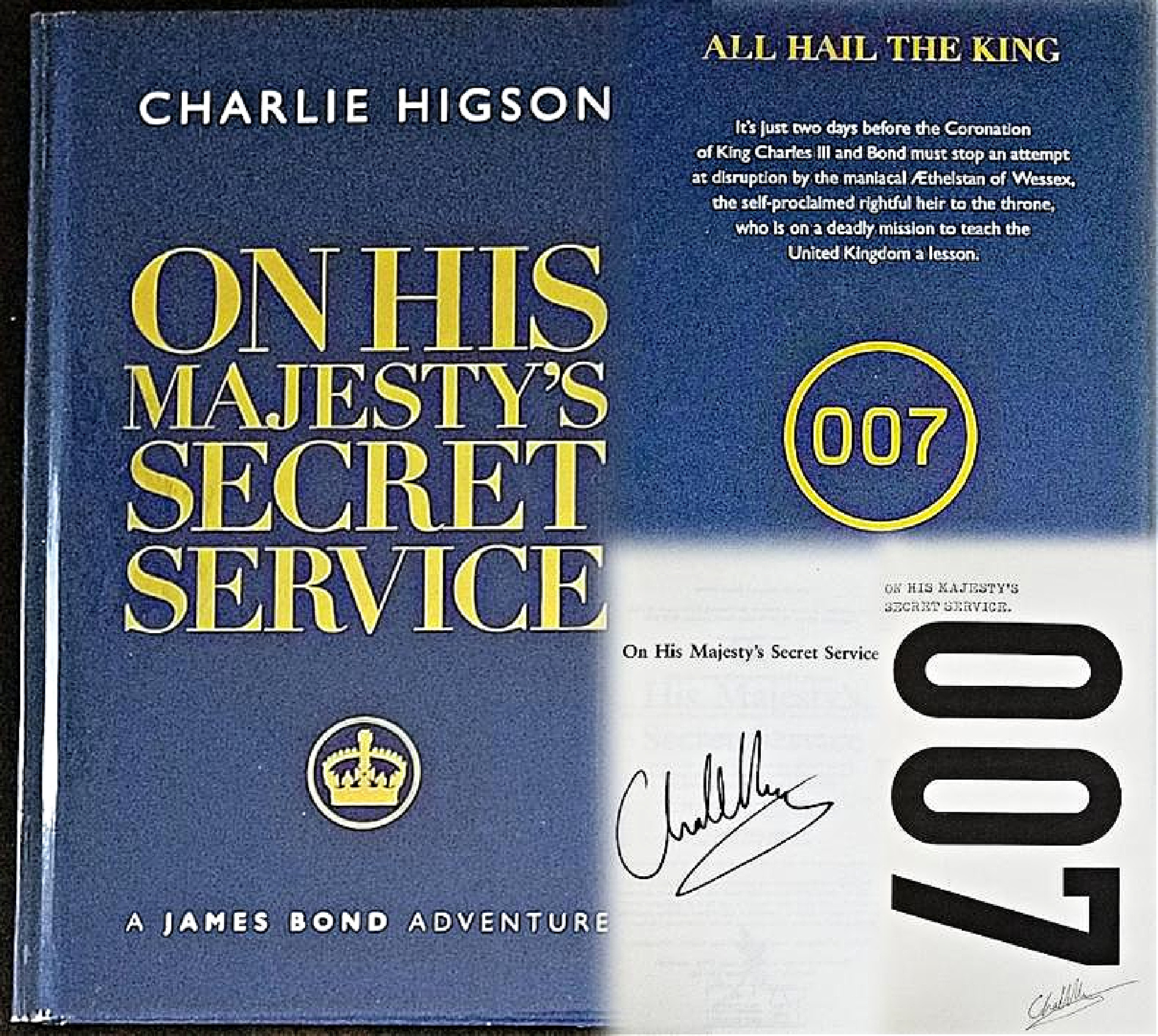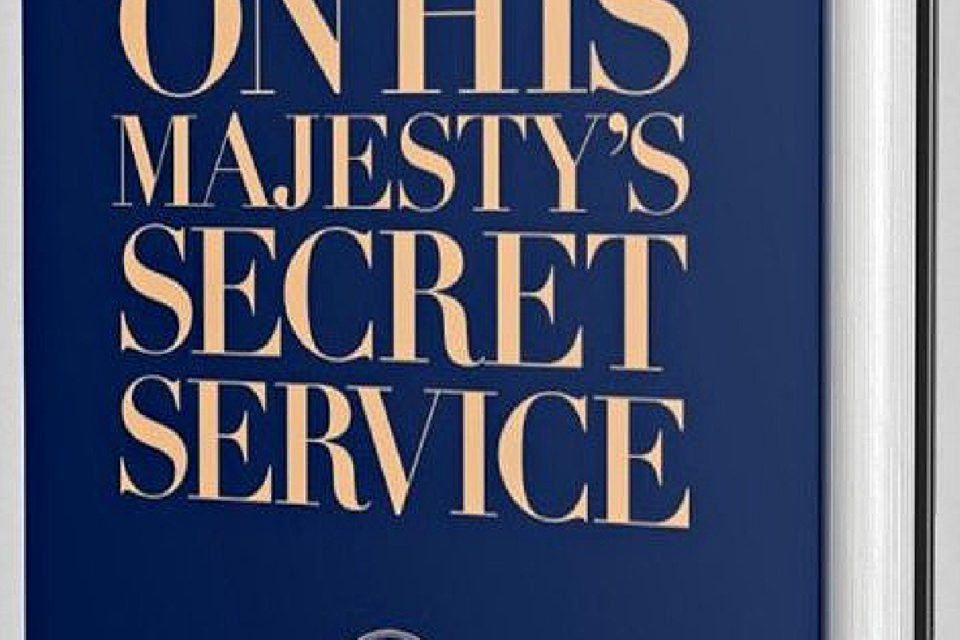It seems only fair to begin a review of this quite unique Bond story with a disclaimer – author Charlie Higson was given only three weeks to write On His Majesty’s Secret Service after Ian Fleming Publications decided in February to create a short story tied to the 60th anniversary of On HER Majesty’s Service in April and the May 6 coronation of longtime James Bond fan King Charles III. With time short, IFP approached Young Bond novelist Higson about writing a 10,000-word short story, with proceeds to be donated to UK charity National Literary Trust. Higson quickly asked for permission to expand it to 20,000 words and wound-up writing nearly 40,000 words in March, including a last-minute addition of a car chase (about the length of Fleming’s final posthumously-released Bond novel, The Man with the Golden Gun). That left only a week for the book to be edited and finalized for publication on May 4 – Higson has said that during his audio book recording he noticed some minor mistakes that got overlooked. Evidence of the currency of the writing includes mentions of this year’s strikes in France over the raising of the retirement age, and even a line about the collapse of Credit Suisse, which happened in mid-March, about six weeks before this book was in stores. (There’s also this reference to King Charles’ infamous snit during a document-signing caught on camera that went viral last fall: “His Majesty is very picky about what pen he uses.”)

The primary woman character in On His Majesty’s Secret Service is described as having “something both ugly and beautiful about her.” The same could be said about this novel – it starts pretty compellingly (albeit with a couple concerning bits about Moneypenny), ends with an exciting intense flourish and is ultimately a satisfying return of literary Bond to the present day – as Fleming always presented him – for the first time in more than a decade, and it’s the first time in more than 20 years that a new 007 novel was published within a year of the previous one (this was the standard in the 1950s, early 60s, 80s & 90s). We also have the anticipated pleasure of reading one of the best-ever authors of Bond stories try his hand at writing about Bond as an adult – Higson wrote five Young Bond novels and a short story in the 2000s (Bond at prep schools in his early teens in the 1930s), several of them as good or better than dozens of other Bond continuation novels of the last 40 years. He comes through with some Fleming-esque flair, such as describing Bond as “a fist, clenched and ready to strike.” And some fun snark when Bond notices the profile of King Charles engraved on a new 50-pence piece: “It was just his luck to finally make it onto British coins and stamps just as people were no longer using cash or sending letters.” But we are also saddled with a slog through about a third of the book with ideologically slanted prose that mentions what seems like every lightning-rod political, cultural, and social button-pushing issue, from Donald Trump and Black Lives Matter to preferences for personal identity pronouns.
<many spoilers alert…>
Despite the marketing and taglines indicating this story takes place two days before the coronation of King Charles, only a combined 11 pages at the beginning and end actually take place in that time-frame, and covering just 26-minutes of that day. Instead, this is a torn-from-the-headlines saga about a planned insurrection by an ego maniac calling himself Æthelstan of Wessex that takes place over two months as Bond follows up on the murder of fellow agent 009 by going undercover to a castle in Hungary to infiltrate a gathering organized by Æthelstan, who is recruiting and preying on easy target radical extremists to help him “make England English again.”
For a short 161-page novella, the book feels bloated, repeatedly beating us over the head with derogatory observations and commentary on the dogma of the villain and his sycophant followers. More off-putting, even for those who may be sympathetic with the quite biased leanings, is that it doesn’t feel right to read such a judgmental tone in a Bond novel. Bond has seldom made his feelings known about polarizing social issues – perhaps the closest he came to a cultural comment was his infamous remark in the 1964 movie version of Goldfinger about needing earmuffs to listen to The Beatles. Higson does give Bond himself a bit of rationalization for this change by writing that “(Bond) disliked anybody, and any movement that was too ‘far’ in any direction.” “He’d spent his life cleaning up the mess these people left and he was sick of it.”
But Higson proceeds to use Bond to fire off a litany of derogatory descriptions of a broad spectrum of conservatives from nationalist extremists to even those who are just anti-woke or who laugh at the evolving recognition of gender identity:
- “Bond felt a deep sense of gloom that this beautiful, civilized, orderly country had been dragged back towards the far right by Viktor Orban, using the crude but effective nationalist playbook.”
- re Orban: “… ‘Make Hungary Great again’ anti-immigration rhetoric. He’d aligned himself with the likes of Trump…”
- re fellow anarchist John Tyler: “Like many of the people in the room, he’d been banned from social media and had his YouTube channel taken down.” “…(others like Tyler with a simplistic, dog whistle agenda of anti-Muslim, anti-immigrant, anti-Semitic, anti-EU, anti-North London Elite rhetoric. The plan was obvious, but effective – identify an enemy to bolster your own power base.” “…he was all over alternative sites like… Truth Social.”
- re another fellow anarchist Saxewell-Brooks: “He was famous for trying to promote a return to Victorian values, despite cheating on his wife…” “About five years ago he’d shot at a group of activist trespassers with a 12-gauge shotgun.” “He’d been a major donor for the Conservative party…”
- re another fellow anarchist Birkett: “…famous for promoting covid/vaccines/mask-wearing/5G conspiracy theories, which had spilled over into the usual anti-immigrant, anti-EU, anti-BBC…, Climate Change Denial pronouncements. It was an anti-trans diatribe that had eventually got him kicked out…”
- re the people at the gathering: “There was not even a pretence at diversity here.” “…it was why his followers loved (Æthelstan).”
- re Cpt Perry Hughes: politician “focused entirely on single issue politics – namely ‘No Wind Farms In Our Beautiful Unspoilt Part of England’.” “He’d featured in a couple of reality programmes… was filmed… giving a drunken rant about Jews running the media…”
- “The men (Bond) talked to… laughing about how much they hated cyclists and bus lanes and congestion charging, and traffic calming, and how global warming was a con, and sooner or later came round to the Big Woke Conspiracy, Black Lives Matter, the Great Replacement, and what are we going to do about the Muslims.”
- Æthelstan: “…men and women. Oh, sorry, not allowed to call them that anymore, are we?” “You haven’t been bamboozled and brain-washed by all this trendy, leftist tommyrot.” “The greatest threat comes from those…who think we should all ride vegan bicycles… or a man in a dress who insists we call him they.” “Perhaps we should better call him King Charles the Woke.” “Only a true born Englishman with a heart of British oak can make England English again.”
- Re yet another anarchist follower Caiboche: “I have no love for Macron’s France.”
- Æthelstan: multiple references to “Capitol riots” – “All those good old boys storming in with their beer bellies sagging over their belts.” “They were like a bunch of baboons who’d escaped from their cage… throwing their shit about. Making lots of noise… but there was no way they were going to end up running the zoo.”
Higson also crams this short novel with 29 named characters, at least three of which also have alternate identities. (One of those characters, called simply Kingsley, appears to be a reference to the first author to pen a James Bond continuation novel in 1968 after the death of Ian Fleming in 1964, Kingsley Amis – initially under the pseudonym Robert Markham. There is also a reference to the signature line from the original On Her Majesty’s Secret Service when Bond’s ally Captain Nick Cornwell says: “I’d love to say we have all the time in the world, but I’d be lying.”)
Fortunately, M and Moneypenny are among the 29 characters, even if their return is very brief. (see list of all characters, weapons, vehicles, writing notes, and complete summary here at my blog James Bond book guide for 007 movie fans )
Higson also returns to the Fleming pre-movie mode of the story being free of gadgets and tricked-out sports cars and Bond using mostly what’s readily available to him for his weapons with the exception of a small sheathed spike in a hidden suitcase compartment. This is a decidedly non-glam Bond, who is perfectly content staying in a budget Premiere Inn, or a Travelodge, and who chooses to wear black desert boots and R.M. Williams Chelsea boots (the latter, ostensibly to blend in). There are also some welcome familiar references to Bond’s preferred breakfast of two eggs scrambled, though now he also adds wholemeal toast and with yogurt because he’s recently read about “gut health” – the importance of nurturing bacteria in intestines.
And Bond is back to the mid-30s age of Fleming’s Bond, although some comments seem to bely that description, such as when Bond thinks to himself that he’s “been doing (this) for so long he didn’t know any more.” And that while “Double O agents usually left the service before they were retired… Bond wasn’t there yet. He still had a few more years in him…”
In any case, Higson has deftly transitioned this Bond into the digital age, with the first references in the written Bond series to everything from Instagram, YouTube, apps including Waze road directions and Google Street View, to facial/retinal recognition, AI and Bitcoin.
Higson leaves some things hanging, such as what happened to a poisoned MI5 agent, and how Moneypenny is holding up after some emotional gut punches, but what we get here is much more literary Bond than we were expecting just a few months ago, and that’s very gratifying.
— By Scott Hettrick
